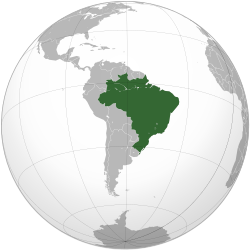Military dictatorship (Brazil)
|
United States of Brazil Estados Unidos do Brasil (1937–1964) Federative Republic of Brazil República Federativa do Brasil (1964–1985) |
||||||||||
| Military Dictatorship | ||||||||||
|
||||||||||
|
||||||||||
|
Motto "Ordem e Progresso" "Order and Progress" |
||||||||||
|
Anthem Hino Nacional Brasileiro Brazilian National Anthem |
||||||||||
| Capital | Brasilia | |||||||||
| Languages | Portuguese | |||||||||
| Government | Federal two-party presidential republic military dictatorship | |||||||||
| President | ||||||||||
| • | 1964–1967 | Humberto de Alencar Castelo Branco | ||||||||
| • | 1967–1969 | Artur da Costa e Silva | ||||||||
| • | 1969–1974 | Emílio Garrastazu Médici | ||||||||
| • | 1974–1979 | Ernesto Geisel | ||||||||
| • | 1979–1985 | João Figueiredo | ||||||||
| Junta | ||||||||||
| • | 1969 |
Aurélio de Lyra Tavares Augusto Hamann Rademaker Grünewald Márcio Melo |
||||||||
| Legislature | National Congress | |||||||||
| • | Upper house | Senate | ||||||||
| • | Lower house | Chamber of Deputies | ||||||||
| Historical era | Cold War | |||||||||
| • | Military Coup d'État | 31 March 1964 | ||||||||
| • | Adoption of dictatorship's Constitution | 24 January 1967 | ||||||||
| • | Adoption of the AI-5 | 13 December 1968 | ||||||||
| • | Economic Miracle | 1968-1973 | ||||||||
| • | Araguaia Guerrilla War | 1966-1975 | ||||||||
| • | Democracy | 15 March 1985 | ||||||||
| Area | ||||||||||
| • | 1903 | 8,515,767 km² (3,287,956 sq mi) | ||||||||
| Population | ||||||||||
| • | 1970 est. | 94 508 583 | ||||||||
| • | 1980 est. | 121 150 573 | ||||||||
| Currency | Brazilian Real | |||||||||
|
||||||||||
The Brazilian military government was the authoritarian military dictatorship that ruled Brazil from April 1, 1964 to March 15, 1985. It began with the 1964 coup d'état led by the Armed Forces against the administration of the President João Goulart, who had assumed the office after being vice-president, upon the resignation of the democratically elected president Janio Quadros, and ended when José Sarney took office on March 15, 1985 as President. The military revolt was fomented by Magalhães Pinto, Adhemar de Barros, and Carlos Lacerda (who had already participated in the conspiracy to depose Getúlio Vargas in 1945), Governors of Minas Gerais, São Paulo, and Guanabara. The coup was also supported by the Embassy and State Department of the United States.
The military dictatorship lasted for almost twenty-one years; despite initial pledges to the contrary, military governments in 1967 enacted a new, restrictive Constitution, and stifled freedom of speech and political opposition with support from the U.S. government. The regime adopted nationalism, economic development, and anti-Communism as its guidelines.
...
Wikipedia



